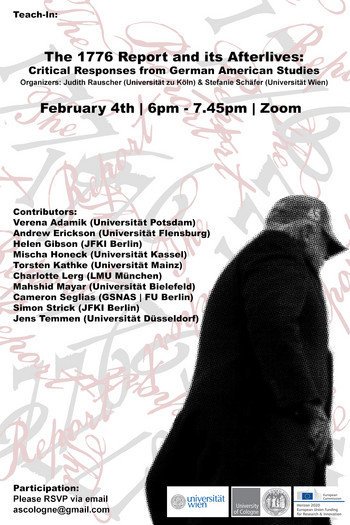Teach-in #3: Invisible Man at 70: Keywords for Teaching Ellison’s Classic Today
*Please note that this event has to be cancelled*
Organizer: Stefanie Schäfer (Vienna/ Erlangen)
Date: June 2, 2022 | 7.30 p.m. | Zoom
Call for Contributions
2022 marks 70 years since the publication of Ralph Ellison’s Invisible Man, a novel that was quickly canonized, and that has “eerily foreshadowed” (Warren 2018) the present moment in US culture. Its negotiation of in/visibility and the Black subject position in US culture resonates, for instance, with the Black Lives Matter Movement, the New Jim Crow, or the renaissance of the Black Arts. At the same time, Ellison’s literary agenda, a “forthright” confrontation of brutalities and simultaneous “thrusting forth” of foundational US humanist ideals renders Invisible Man a classic of American literature—and a key reference in the interdisciplinary American Studies classroom. So--how teach it today?
As part of the virtual “Doing│Teaching American Studies” series, “Invisible Man at 70” invites teachers of American Studies (from early career to experienced scholars) to contribute a short input on Invisible Man in a “keywords”-format: Your keyword-input surveys the meanings of a select character, motif, or historical reference, both in the novel itself and regarding its potential meanings in the (German speaking) American Studies classroom. Keywords could be, for instance, In/Visibility and Recognition, Ras the Exhorter, HBCUs, the Zoot Suit, Black masculinities, Post/Modernism, the Yam, the Harlem Renaissance...tbc!
Our aim for this virtual teach-in on June 2 is to combine wide and close readings of keywords for Invisible Man with an exploration of teaching literature as embodied practice, and to contribute a teaching angle on what Ilka Brasch and Alexander Starre (2022) have so poignantly called a turn to “method as practice” in American Studies.
Please submit your keyword with a short abstract to stef.schaeferfau.de by May 2, 2022.
Teach-in #2: Re-reading bell hooks - Being with bell
Organizers: Nele Sawallisch (Trier) and Judith Rauscher (Cologne)
Date: February 3, 2022 | 7.30 p.m. | Zoom
Join us for the second installment of our Doing/ Teaching American Studies series. During the Teach-in, which will take place on February 3, 2022, from 7.30 - 9.15 p.m. via Zoom, American Studies scholars from different German universities will share their reflections and lead a conversation about the impact of the work of the late Black feminist, scholar, activist, and educator bell hooks.
Contributors
Nathalie Aghoro (Eichstätt)
Tensae Desta (Cologne)
Courtney Moffett-Bateau (Bremen)
Rahab Njeri (Cologne)
Christine Vogt-William (Bayreuth)
In order to register for the event, please send an email to american-studies[at]uni-koeln.de. Please register by 4 p.m. on the day of the event, so wie can send you the Zoom information in time for the Teach-in.
Teach-in #1: The 1776 Report and its Afterlives: Critical Responses from German American Studies
Organizers: Judith Rauscher (Cologne) & Stefanie Schäfer (Vienna)
February 4, 2021 I 6pm - 7 .45pm I Zoom

Published on the eve of the Trump Presidency by "The President’s Advisory 1776 Commission," only days after militant white supremacists stormed the United States Capitol, the 1776 Report documents the Trump administration’s efforts at legacy building. The report talks back against the 1619 Project, which reframes the history of the United States by tracing the country’s origins back to the arrival of the first enslaved African peoples on North American shores and by exploring the impact of anti-Black racism on its social, economic, and political development ever since. The 1776 Report seeks to defend what it represents as “the facts of [the] nation’s founding” and to achieve what it calls “a restoration of American education,” peddling exceptionalist mythographies linked to the founding of the United States and the Declaration of Independence. In doing so it spells out Trump’s populist strategy to “animate […] white settler-colonist attitudes and animosities” (Pease 2020, 25)1 to denigrate liberal institutions and protest movements such as Black Lives Matter.
The 1776 Report received sharp criticisms by historians and American Studies scholars across the world; it was publicly condemned by the American Historical Association (AHA) and the American Association of University Professors (AAUP). After President Biden issued an executive order dissolving the 1776 Commission on January 20, 2021, the report was removed from the White House website, turning it into a haunting presence in the United States cultural archive.
On February 4, 2021, nearly 80 scholars and students of American literature and culture came together in a virtual meeting organized by Stefanie Schäfer (Vienna) and Judith Rauscher (Cologne) for a teach-in on the 1776 Report. After listening to short comments by 10 specialists in American cultural studies and American history from universities across Germany on individual sections and themes in the report, the participants of the teach-in discussed the afterlives of Trumpism in the American public sphere and beyond, including its meanings for the American Studies classroom.
1 Pease, Donald. “Donald Trump’s Settler-Colonist State (Fantasy): A New Era of Illiberal Hegemony?” Trump’s America. Political Culture and National Identity. Ed. Liam Kennedy. Edinburgh: Edinburgh University Press, 2020, 23-52.
Program Teach-in #1: The 1776 Report and Its Afterlives
Welcome and Opening (Judith Rauscher, U of Cologne)
Background/History of the Commission (Torsten Kathke, U of Mainz)
The Meaning of the Declaration (Mischa Honeck, U of Kassel)
Slavery (Cameron Seglias, FU Berlin)
Communism (Verena Adamik, U of Potsdam)
Racism and Identity Politics (Simon Strick, JFKI Berlin)
------------------------------------------ Short Break ---------------------------------------------
Teaching America (Charlotte Lerg, LMU Munich)
The American Mind (Stefanie Schäfer, U of Vienna)
Appendix III (Helen Gibson, JFKI Berlin)
Absences in the Text (Andew Erickson, U of Flensburg)
US-Imperialism (Mahshid Mayar, Bielefeld, and Jens Temmen, U of Düsseldorf)
Discussion and Summary (Stefanie Schäfer, U of Vienna)
Click here for a list of useful resources on the 1776 Report.